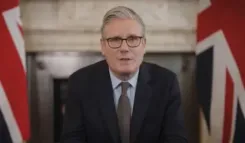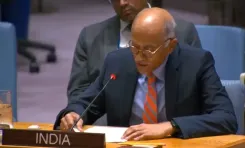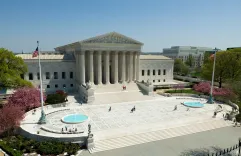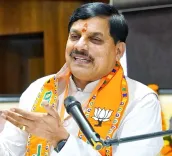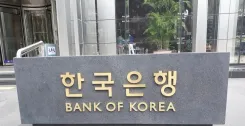Political Stalemate: Optimism Grows for France's 4th Prime Minister This Year to Heal Divisions
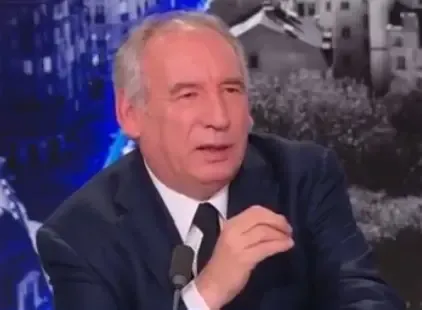
Paris, Dec 15 (NationPress) The appointment of Francois Bayrou as prime minister of France—making him the fourth person to take on this role this year—brings a semblance of hope to the ongoing political deadlock in the country.
As the centralist ally of French President Emmanuel Macron grapples with the fractured political terrain at home, Bayrou has the potential to rejuvenate crucial France-Germany relations, especially with the prospect of a second term for Donald Trump looming, according to a report by Xinhua news agency.
BAYROU'S TIGHTROPE
In response to Bayrou's nomination, the far-right party National Rally (RN) indicated it would refrain from immediately censuring him.
RN's president, Jordan Bardella, remarked on BFMTV that Bayrou must recognize he lacks both democratic legitimacy and a majority in the National Assembly, necessitating discussions with all parliamentary factions.
Former RN leader Marine Le Pen, who ranked third in the last presidential election, urged Bayrou to engage with opposition parties to formulate a sensible and thoughtful budget.
"Any policy that merely extends Macronism, which has been rejected at the polls, could only result in deadlock and failure," she expressed on her X account.
Meanwhile, the leftist party La France Insoumise has announced its intention to initiate a no-confidence vote against Bayrou.
This party has consistently argued that the prime ministerial position should be filled by someone from the left-wing coalition, which secured the most seats in this year's snap legislative elections.
However, other factions within the left-wing coalition, known as the New Popular Front, have taken a less confrontational stance toward Bayrou and have outlined specific conditions for their support.
In a correspondence to Bayrou, the Socialist Party warned that Macron's decision to appoint a prime minister from his own camp could exacerbate the political and democratic crisis that has enveloped the nation since the dissolution of the National Assembly.
The Socialist Party insisted that the new prime minister must forgo the use of special constitutional powers to pass laws without a vote in the National Assembly, in exchange for their decision not to vote him out.
This party, which will not be part of the incoming government, also called on Bayrou to distance himself from the far-right RN and its "xenophobic" agenda.
The French Communist Party declared it would not attempt to oust Bayrou "if there is no Article 49.3,” the special constitutional power previously used by former Prime Minister Michel Barnier to push through the 2025 social security budget without parliamentary approval.
Marine Tondelier, head of the Ecologists party, stated that should Bayrou fail to address issues relating to pensions, environmental concerns, and tax equity, her party would have no option but to vote against him.
TWO BANKS OF THE RHINE
In the wake of Donald Trump's electoral victory, Macron reached out to German Chancellor Olaf Scholz, expressing a desire to "forge a more united, stronger, and sovereign Europe."
Nonetheless, strengthening France-Germany cooperation is hindered by political gridlocks within both nations.
As reported by Politico, at the Berlin Global Dialogue in October, Scholz and Macron expressed divergent views on critical issues like proposals for joint EU borrowing, trade negotiations with South American countries, and strategies to counter the protectionist stance of the United States.
Germany, being the largest economy in Europe, is also embroiled in a political crisis. The current government will face a vote of confidence in the Bundestag next week.
Recently, Francois Villeroy de Galhau, Governor of the French Central Bank, urged a united front between France and Germany to address the challenges facing Europe.
"Presently, the dialogue between France and Germany has been undermined, primarily due to domestic political instability on both sides of the Rhine," de Galhau stated.
"To divide us would be to condemn us, and to condemn Europe," he added, referencing the long-term challenges confronting Europe, such as climate change, an aging population, digitalization, geopolitical crises, and Trump's electoral victory.
Europe seems to have made some progress with the appointment of France's new prime minister. However, it remains uncertain whether France and Germany can guide Europe as a stabilizing force during a second Trump term.
HOW FRANCE GOT HERE
The political turmoil in France began in June when Macron announced the dissolution of the National Assembly after his coalition faced defeat in the European parliamentary elections.
During the two rounds of legislative elections on June 30 and July 7, Macron's centrist coalition lost its absolute majority, allowing the left-wing party coalition, the New Popular Front, to claim a relative majority in the 577-seat National Assembly.
Instead of quickly appointing a prime minister from the winning coalition, Macron accepted the resignation of Gabriel Attal but tasked him with leading a caretaker government.
The ministers from Attal's government participated in the election for the speaker of the National Assembly, where Yael Braun-Pivet, from Macron's party, was re-elected.
Two months after the legislative elections, Macron finally appointed Michel Barnier from the Republican party to form an "inclusive" government.
With Barnier utilizing the special constitutional power 49.3 to ensure the passage of the 2025 social security budget without parliamentary approval, members of the French National Assembly voted in favor of a no-confidence motion, leading to Barnier's resignation and the collapse of his government.
A total of 331 deputies, primarily from the New Popular Front and RN, supported the motion. This rare alliance between the left and the far right in French politics marked a significant crisis, as Barnier's government became the first to fall due to a no-confidence vote since 1962. In 2024, France has witnessed the appointment of four prime ministers: Elisabeth Borne, Attal, Barnier, and now Bayrou.

